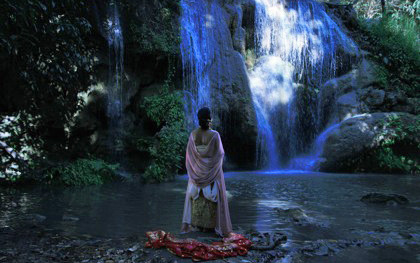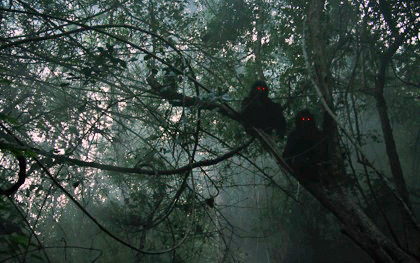Festivals
London Film Festival 2010: The S&S blog
Sight & Sound special screening:
Uncle Boonmee Who Can Remember His Past Lives

Kieron Corless, 18 October
If last year’s big LFF buzz-film was Dogtooth, this year’s has to be the Palme d’Or winner from Thailand, Uncle Boonmee Who Can Recall His Past Lives, directed by Apichatpong ‘Joe’ Weerasethakul, which this magazine was thrilled to have as its gala screening on Sunday night.
Expectations were astronomically high: Apichatpong has raised the bar himself with his previous three features, all phenomenal in their own particular ways, plus an array of gallery-based work and shorts, becoming in the process a talismanic figure for a certain kind of contemplative, exploratory, expanded cinema. But as I joined the excited throng at the Vue in Leicester Square, I’d be lying if I said I didn’t feel some apprehension that Uncle Boonmee would fail to live up to the hype a Cannes winner inevitably generates.
For some strange reason the LFF ad played twice before the film started. Was this a deliberate attempt to unsettle us and put us in the right ‘zone’? Or a nod to Joe’s penchant for bifurcated structures (which incidentally he seems to have abandoned here)? Joe himself introduced the film, drawing attention to its hybrid nature: some people view it as sci-fi, others horror. Just recently it played at a festival of fantastic cinema. Still others find it comical (it does have one killer line early on). But most of all Joe urged us to abandon any attachment to logic or preconceptions about what a film narrative should be, which proved sound advice indeed.
And so it began. Pretty soon it became apparent that this was something special. You can always tell when an audience is in thrall, spellbound; there’s a palpable quality of attention, a sense of total collective immersion.
Uncle Boonmee basically breaks down into a series of 20-minute segments, all quite different stylistically; but it’s the way Joe makes the transitions between them feel so seamless that, as much as anything, marks him out as a miraculous editor. Many people were bowled over by the scene in which a disfigured princess is firstly conversed with and then pleasured by a catfish, and for sure it’s like nothing you’ll ever have seen before. But the sequence where the dying Boonmee recounts a dystopian dream over a series of still photos of young boys in military uniform completely froze my blood.
We’ve put Apichatpong on the cover of the December issue of Sight & Sound (out 2 November) under the moniker ‘Extraordinary Joe’, and that feels completely apposite; right now he has to be one of the most groundbreaking directors at work anywhere in the world.

The Q&A, led by S&S editor Nick James, was fascinating. Joe proved to be cool, clever, diffident, the epitome of courtesy and geniality. Unfortunately I was still stranded somewhere in Apichatpong-land, and kept getting distracted by what was happening to the left of the auditorium, where the heads of producers Simon Field and Keith Griffiths and various New Wave distribution staff were just discernible over a side wall, bobbing about and peering at proceedings. I kept imagining their heads adorned with striking, ominous red eyes, just like the strange monkey-like creatures in the film (above). Now that really would have been a Q&A to remember.
The final scene in the film sees two characters splitting into two separate selves – one pair watching TV, the other heading out for dinner. It’s a genius idea, not least because it suggests one way of coping with the plethora of fine films at this year’s LFF, which is turning out to be the best in my memory. Discussion of this final scene towards the end of the Q&A started to veer into the realm of quantum physics; unsurprisingly, our editor chose to wrap proceedings right there, with what looked like an expression of relief on his face.
The mood at the reception afterwards was jubilant and celebratory. I heard nothing but out-and-out praise for the film, not a single reservation; that sort of critical unanimity is very rare in my experience. It should be noted that Uncle Boonmee is co-produced by a British company, Illuminations; hearty congratulations are due to Field and Griffiths, two of the most courageous and imaginative producers in the business. It’s a very strong British line-up at this year’s LFF – the new films by John Akomfrah, Clio Barnard and Patrick Keiller are especially outstanding – but winning the Palme d’Or with Apichatpong has to be the pinnacle of British filmmaking achievement in 2010.
As chance would have it, I found myself face-to-face with Apichatpong at 9.30am next morning, for our Sight & Sound interview. Joe had a heavy cold, but was still as warm, generous and incisive as ever. You’ll find that interview in the December issue, alongside a brilliant piece on Apichatpong’s career to date by Adrian Martin.
A quick chat before the interview with the publicist turned to the subject of the film’s prospects in the UK market (possibly damaged, in my opinion, by an incredibly lazy and ill-judged article that appeared on the Guardian’s film website recently about Uncle Boonmee’s supposedly poor reception in France – a woefully partial and selective survey, and curious postscript to Peter Bradshaw’s five-star review). These are difficult times for the smaller distributors trying to release adventurous subtitled films in Britain, but more than any other I can think of, Uncle Boonmee deserves to break out of the ‘arthouse’ ghetto to a wider audience, and give its excellent distributors New Wave a much-deserved minor hit. It opens on 19 November; go, and be astonished.
Jamie Thraves’ Treacle Jr.
and Peter Mullan’s Neds »
See also
London Film Festival 2010: 30 recommendations (online, October 2010)
30 key films of the 2000s including Weerasethakul’s Tropical Malady (February 2010)
Sight & Sound’s best online videos of 2009 led by Phantoms of Nabua (online, January 2010)
Tropical rocket: Tony Rayns on Weerasethakul’s ‘Primitive’ exhibition at Liverpool’s Abandon Normal Devices festival (online, October 2009)
Syndromes and a Century reviewed by Tony Rayns (October 2007)
Beyond the horizon: Mark Cousins on Peter Sellars’ New Crowned Hope film commissions (July 2007)
Tropical Malady reviewed by Roger Clarke (March 2005)
Tropical Malady reviewed by SF Said (November 2004)
